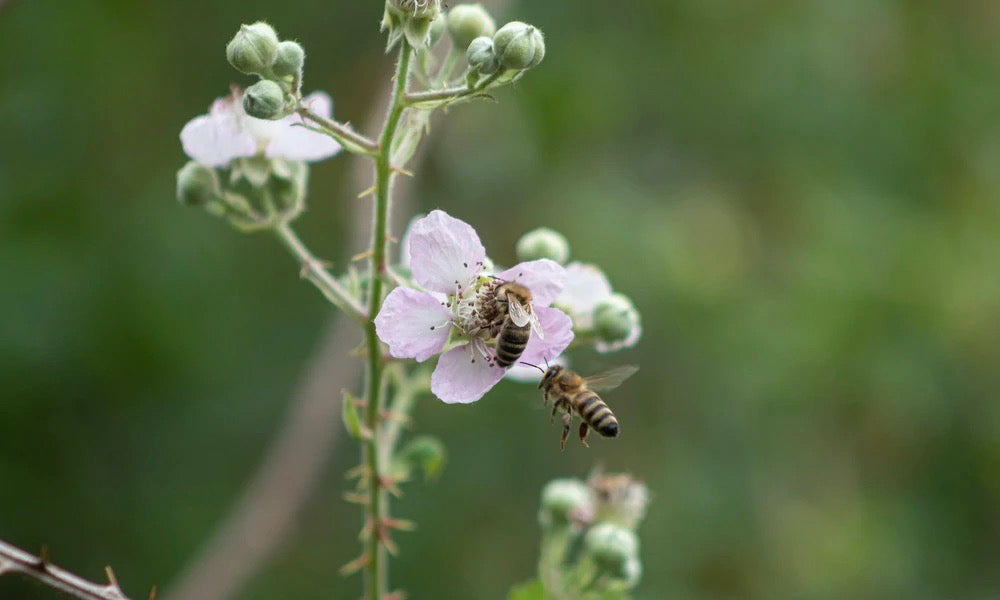
WHY OUR PRODUCTION HOSTS BEES
Carolin Ziegler/ March, 2021
It's on everyone's lips: bees are dying out. So, the fact that the little insects should be protected is not news to most. However, many do not seem to be aware of the elementary importance of bees for our planet. But what makes them so important to us?
In fact, bees have such an immense impact that they can be considered the foundation of a healthy ecosystem. On the one hand, when they swarm out, they serve as important pollinators of countless plants, and on the other hand, they ensure the preservation of biological diversity. Although other insects are also involved in pollination, bees play a central role in most regions: around 80 percent of all crops and wild plants depend on them for pollination. Bees are therefore mainly responsible for our food supply, good harvests, and biodiversity. Around one third of our food is based on pollination by bees and other insects. Often, agricultural production is only made possible by the bee, which is why it is even classified as the third most important farm animal worldwide. We can already imagine how serious the consequences would be for us and the planet if the bee were to become extinct.
WHAT IS BEE EXTINCTION ALL ABOUT?
Although the bee has become an indispensable part of human life - a world without it seems increasingly conceivable. For several years, there have been periodic significant declines in the global bee population. Around one in seven honeybee colonies died in the winter of 2018/2019. And while the debate about the future of the honeybee is undoubtedly important, at the same time a more pressing problem, namely the extinction of the wild bee, is receding into the background. Especially wild bee populations have a direct impact on the ecosystem and other animal and plant species. This makes them indispensable for preserving biodiversity and particularly worthy of protection. However, of the 500 or so wild bee species that occur in Germany, around half are now threatened with extinction. The last two decades in particular have seen a dramatic decline in bee colonies. This is mainly due to industrial agriculture, which destroys the natural habitats of bees through land sealing and the use of fertilizers and pesticides. In addition, climate change is altering the seasons and, as a result, the flowering times of many plants no longer coincide with the bees' cycle.
Whether wild bees or honeybees - one thing should be clear to everyone: if bees were to actually become completely extinct, the consequences for the planet would be devastating. Certain plant species would no longer be able to reproduce, which would lead to the extinction of birds, insects and mammals that depend on them. This in turn would have a huge impact on our ecosystem. There would be crop failure and thus food shortages in many areas. And unfortunately, the bee's function cannot be replaced, at least not as things stand today.
HOW TO HELP THE BEE
To ensure the preservation of bees, the protection of natural and near-natural habitats is necessary above all. Environmental organizations such as Greenpeace, for example, are calling for the abandonment of all pesticides that are harmful to pollinators, as well as financial support for ecological agricultural models. They also encourage the creation of nesting sites and flower resources for bees on farms. But even seemingly simple steps, such as purchasing a beehive, can have a big impact. As the natural dwellings of bees are disappearing at an accelerating rate due to increasing urbanization, most domesticated honeybees today live in such man-made hives, known as beehives. In a bee colony live at swarm time up to 60,000 animals, of which the majority consists of female workers. A single bee colony can thus pollinate more than ten million flowers a day.
Such a settlement of bee colonies is therefore enormously effective and very desirable, especially in large cities or industrial areas. And not only honeybees, but also wild bees can be given shelter in their own gardens by setting up nesting aids for them. In Germany, a very large proportion of beehives are now owned by amateur beekeepers. However, more and more private individuals and companies such as our production facility are also creating their own beehives, thus supporting not only the preservation of urban green spaces, but also that of bee colonies and thus our entire ecosystem.




